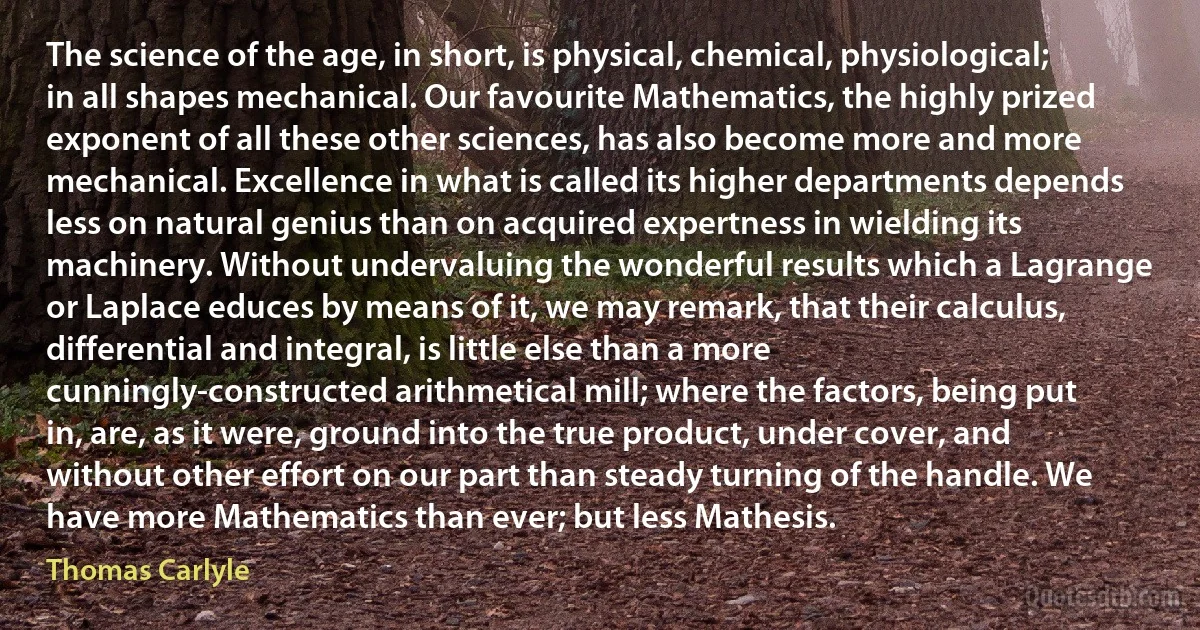
The science of the age, in short, is physical, chemical, physiological; in all shapes mechanical. Our favourite Mathematics, the highly prized exponent of all these other sciences, has also become more and more mechanical. Excellence in what is called its higher departments depends less on natural genius than on acquired expertness in wielding its machinery. Without undervaluing the wonderful results which a Lagrange or Laplace educes by means of it, we may remark, that their calculus, differential and integral, is little else than a more cunningly-constructed arithmetical mill; where the factors, being put in, are, as it were, ground into the true product, under cover, and without other effort on our part than steady turning of the handle. We have more Mathematics than ever; but less Mathesis.
Thomas CarlyleRelated topics
age calculus chemical cover differential effort exponent genius ground handle integral less machinery mathematics mill natural science short turning under wielding means laplace higher sciencesRelated quotes
Let us imagine that the aboriginal-original human specimen was one of two brother apes, A and B; they were alike in every respect; both were animal space-binders; but something strange happened to B; he became the first time-binder, a human. ... He had thus a new faculty, he belonged to a new dimension; but, of course, he did not realize it; and because he had this new capacity he was able to analyze his brother "A"; he observed "A is my brother; he is an animal; but he is my brother; therefore, I AM AN ANIMAL." This fatal first conclusion, reached by false analogy, by neglecting a fact, has been the chief source of human woe for half a million years and it still survives. ... He [then] said to himself, "If I am an animal there is also in me something higher, a spark of some thing supernatural."

Alfred Korzybski
For what advantage is it, that the world enjoys profound peace, if thou art at war with thyself? This then is the peace we should keep. If we have it, nothing from without will be able to harm us. And to this end the public peace contributes no little: whence it is said, ‘That we may lead a quiet and peaceable life.' But if any one is disturbed when there is quiet, he is a miserable creature. Seest thou that He speaks of this peace which I call the third (inner, ed.) kind? Therefore when he has said, ‘that we may lead a quiet and peaceable life,' he does not stop there, but adds ‘in all godliness and honesty.' But we cannot live in godliness and honesty, unless that peace be established. For when curious reasonings disturb our faith, what peace is there? or when spirits of uncleanness, what peace is there?

John Chrysostom
Don't forget that God sees you and watches you when you are in pain; He perceives even the beating of your heart. Consequently, He will not leave you without consolation and His fatherly protection. Naturally, the saints rejoiced in their afflictions; as for us, let us at least manage to accept affliction or pain patiently.
My child, pray within your heart, and the name of Jesus will become for you a comforting balm so that you can bear this trial of yours in a way which benefits you. You will greatly benefit from this trial if you submit yourself to it patiently. So again I say to you, with the almighty armor of prayer continually approach the omnipotent Lord more often, and you will come to know how He wondrously lifts the burden of pain and marvellously gives rest to sufferers.

Ephraim of Arizona
A small beginning has led us to a great ending. If I were to put the bit of chalk with which we started into the hot but obscure flame of burning hydrogen, it would presently shine like the sun. It seems to me that this physical metamorphosis is no false image of what has been the result of our subjecting it to a jet of fervent, though nowise brilliant, thought to-night. It has become luminous, and its clear rays, penetrating the abyss of the remote past, have brought within our ken some stages of the evolution of the earth. And in the shifting "without haste, but without rest" of the land and sea, as in the endless variation of the forms assumed by living beings, we have observed nothing but the natural product of the forces originally possessed by the substance of the universe.

Thomas Henry Huxley
Had there not been a natural goodness and indestructible force in my father, I see not how be could have bodied himself forth from these mean impediments. I suppose good precepts were not wanting. There was the Bible to read. Old John Orr, the schoolmaster, used from time to time to lodge with them; be was religious and enthusiastic (though in practice irregular with drink). In my grandfather, also, there seems to have been a certain geniality; for instance, he and a neighbor, Thomas Hogg, read "Anson's Voyages;" also tho "Arabian Nights," for which latter my father, armed with zealous conviction, scrupled not to censure them openly. By one means and another, at an early age he had acquired principles, lights that not only flickered, but shone steadily to guide his way.

Thomas Carlyle
